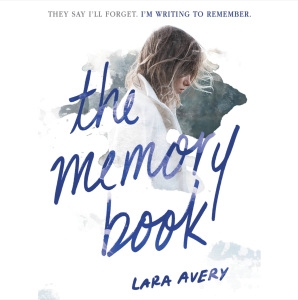
Erika DiPasquale, Associate Editor
February 25th, 2017
Lara Avery’s The Memory Book is the next The Fault in Our Stars and the Young Adult equivalent of Still Alice. Upon being diagnosed with Niemann-Pick Type C, a genetic degenerative disease that causes severe physical and mental handicaps, memory loss, and ultimately death, Sammie, a high school senior, starts an electronic journal in conversation with her future self. Despite the diagnosis, she’s convinced that she can still win debate nationals, give her valedictorian speech, go to NYU and law school, and become a defense lawyer worthy of Senator Elizabeth Warren’s praise. As her NPC episodes increase and her imagined future self unravels, her relationships get more complicated—including two love interests—forcing her to self-reflect and revise her values and goals.
What makes this book extraordinary, and worthy of its place on the Barnes & Noble Best Young Adult Books of 2016 list, is the character development. How Sammie chooses to tell her story in her journal builds her into an honest, Type A character. She’s socially awkward, ultra-driven, and dynamic. When she’s experiencing a NPC episode, her tone, diction, and syntax change significantly, adding to the authenticity of her character and narrative. A few other characters contribute to her memory book and their voices are marked by distinctly different tones and syntax. Thus, each character feels like an authentic person with realistic reactions to Sammie’s condition.
Another refreshing quality about this book is that it’s not cliché. The diary-like form is paired with a strong, confident voice rather than an angsty, insecure one. The romance sub-plot is indeed secondary to the main self-growth plot line and even undergoes an unexpected twist. Sammie’s fate is as unpredictable as her romantic relationships because of the form, confident tone, and selection of detail. Furthermore, the theme isn’t the trite make the most of life and love in the face of adversity as many sick-teenager narratives preach. Rather, it encourages self-reflection and self-growth in periods of uncertainty and probable doom.
This theme, in conjunction with the realistic characters, make it suitable for any audience. Anyone in a transition period will relate to Sammie’s story regardless of their age or gender, especially seniors about to graduate. Sammie’s character will resonate with readers who set high expectations for themselves, have experienced social anxiety, and/or who are passionate about what they do. The debilitation that NPC causes Sammie makes the story relatable for anyone diagnosed with a chronic disease or disability or whose loved ones experience such circumstances. However, one doesn’t need to be in any of these categories in order to appreciate this story: the universal themes of self-reflection and growth in conjunction with the experiences of strained friendships and romantic and familial relationships make this a heart-wrenching, tear-jerking story for readers of all identities and experiences to enjoy.
I cannot attest whether Avery accurately represents NPC. In the acknowledgements, Avery says, “To anyone who has had to suffer through a terminal disease like Niemann-Pick (or anyone who is related to someone who has), thank you for the liberty to live in your shoes for a few hundred pages. Forgive me for inconsistencies and exaggerations. If the way I told Sammie’s story doesn’t feel right, write to me. Or better yet, write it the way you would like to see it.” But regardless of its accuracy, the story is still a powerful one about life, love, and the flexibility of values.
